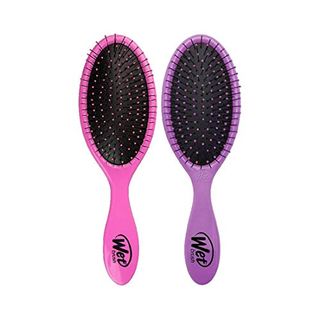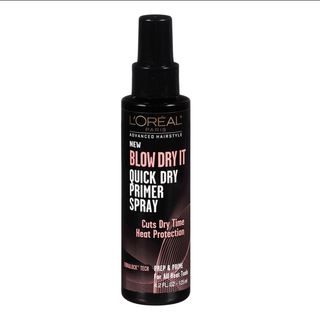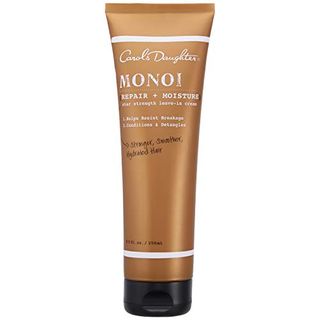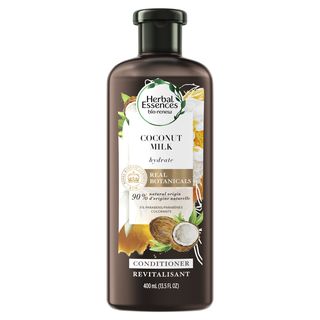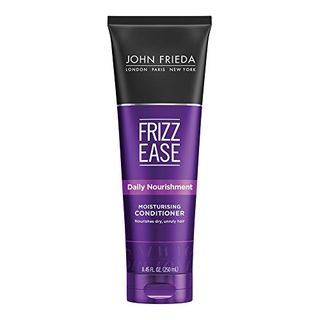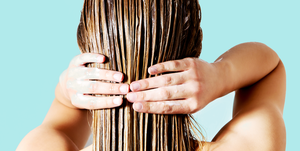When you’ve been clinging onto your last haircut for a bit too long, your hair shows it. Your ends start to tangle easily, they look drier than the rest of your hair, and they begin to have a crunchy feel to them.
“Split ends are fraying of the ends of our hair,” said Joyce Davis, M.D., board certified dermatologist. “Various physical and chemical factors (both environmental and cosmetic) can cause progressive damage to the cuticle that normally protects our hair. When this is lost at the hair tip, the underlying fibers separate.”
What causes split ends in the first place?
The reason that split ends happen at the ends is because your hair is oldest there, according to Davis. You can have both physical and chemical damage to your hair, and knowing the difference between the two kinds of damage can help you figure out the best strategy to prevent further splitting.
Physical damage can come from brushing or combing, using hot tools like curling irons or straighteners frequently, hair elastics, and tight hairstyles like braids.Chemical damage comes from coloring your hair (whether it’s with bleach or a dye), relaxing or perming treatments, and even keratin treatments.
We gathered advice from the Good Housekeeping Institute Beauty lab and experts to determine how to do damage control on any split ends that you may already have:
How to fix split ends
Here’s the truth: There’s no way to fully hair once it’s been broken. “Products like split end menders, leave-ins, conditioners and treatment masks can seal the outer layer of strands so they temporarily appear smoother and less frayed and feel softer,” says GH Beauty Lab Director Birnur Aral, Ph.D.
But at the end of the day, the only solution for split ends is to cut them off. If you’re noticing that your hair is starting to snag together, it’s tangling easily, your curl pattern is starting to change, or your split ends are traveling up your hair shaft, it’s time to head to the salon (or grab the shears yourself!).
How to prevent and camouflage split ends
After your next trim, try these fixes that can help disguise frayed hair and prevent split ends before they start:
1. Don’t brush wet hair.
Wet hair can be especially prone to damage. “Water swells and stretches the hair’s shaft, which causes the shingle-like outer layer to lift. Adding stress from brushing in that state can cause it to break,” says Sabina Wizemann, Good Housekeeping Beauty Lab senior chemist. Wizemann recommends brushing hair before you get it wet.
If you have to comb through your hair after you shower, try towel drying until it’s not dripping, then apply a leave-in conditioner all over hair before attempting to detangle. The tool you choose to use matters here — Davis recommends opting for a wide-toothed comb or a Wet Brush, which is specifically designed to protect wet hair.
2. Be gentle on your strands.
“Don’t yank or pull strands when styling” or brushing, Wizemann says. Start from the ends and work your way up the hair in small sections. Never use a rubber band or a hair accessory with metal, which can tug and break hair. Instead, look for accessories made of or wrapped in fabric. Avoid tight braids or ponytails when you can.
3. Turn down the heat.
Heat can cause major damage to your strands, particularly if you don’t take the right precautions. “Fully dry hair before using a styling iron, as any water trapped within strands can heat up and expand, leading to extra damage,” says Aral. “Apply a heat- or thermal-protection styling product all over hair prior to hot tool use. It will coat strands with ingredients like polymers that can stand up to high temps, creating a shield that conditions, which reduces damage.”
If you can, air-dry your hair — your split ends will thank you. If not, try the Dyson Supersonic Hair Dryer, which showed a maximum heat of about 10°F lower than the average temperature of 18 hair dryers in our 2016 Beauty Lab test, meaning it may be less damaging to hair than an average dryer. When you use hot tool, put it on the lowest heat setting possible to mitigate damage.
4. Back off hair dyes.
Chemicals can cause severe damage if they’re not applied correctly. Make sure you’re applying color to just the roots when you’re doing a touch-up so that your ends don’t get fried by too many chemicals.
5. Sleep on silk.
Sleeping on a silk pillowcase or using a silk hair cap can help reduce friction that results in hair damage and less smoothness. Satiny fabric will keep your hair looking healthy, shiny, and damage-free for longer.
6. Deep condition often.
Conditioning your hair is one of the best things you can do to help get rid of split ends. When you have split ends, your hair needs more hydration than ever. “[Conditioners] coat wet hair so it’s easier to detangle, which can lead to less damage and make it softer and more manageable,” Aral says.
